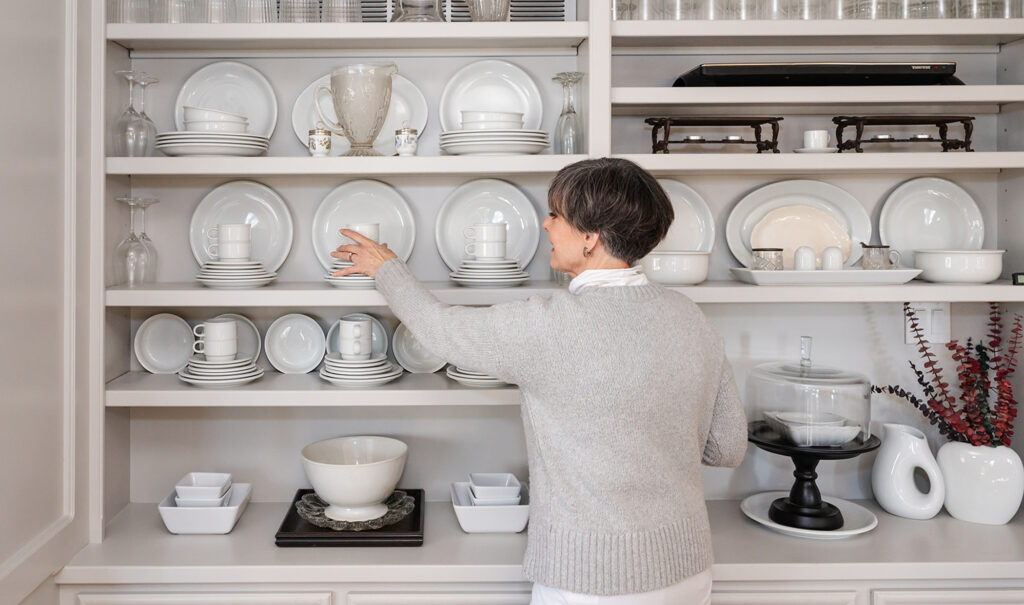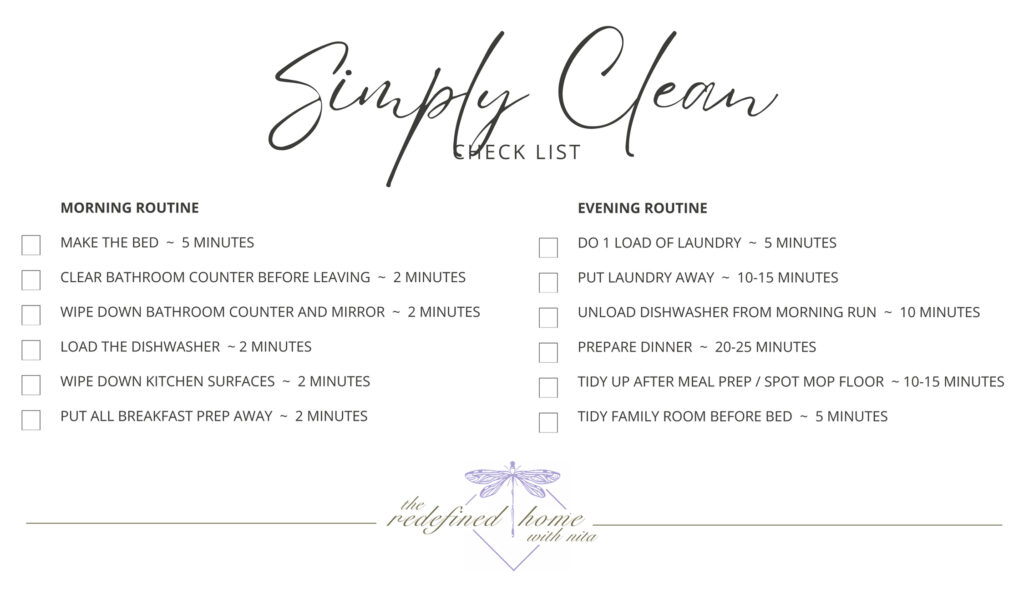Have you ever walked into someone’s home and marveled at how effortlessly clean and organized it is? No piles of shoes by the door, no piles of laundry to step around, no cluttered countertops—just calm, order, and space that feels good — a natural kind of good. Contrary to popular belief, these people aren’t born with magical cleaning powers. They simply have a few clear-sighted habits that take very little effort but make a huge difference.
Here are 9 secrets of people with a tidy home — adopt one, adopt them all, you’ll love the results!
1. They Clean as They Go
What’s one of the biggest game-changers? Tidy people don’t wait for messes to pile up. Whether it’s putting dishes straight into the dishwasher, wiping down the counter after cooking, or folding laundry immediately, they handle small tasks in the moment—so they don’t become mega jobs later. Procrastination is not a consideration. If you tend to tell yourself you’ll do it later, change that inner voice to “This will only take a second.” Presto! You’ve won and you’re done!
2. Everything Has a Home
“A place for everything and everything in its place” is more than just a saying; it is words of wisdom. If an item doesn’t have a designated spot, it turns into clutter. People with tidy homes make sure every item has a “home,” from shoes to mail to remote controls. No matter how messy a project gets as it’s in progress, when the project is over, cleanup becomes automatic, effortless, and instantaneous when everything has a ‘home’.

Open shelves need a lot of attention. Tidy people keep things simple by staging open shelves with frequently used items. Then, when an item is used, they dust the shelf before returning the item; so easy and effortless.
3. They Stick to a Routine
Tidy homes don’t just happen—they’re the result of daily and weekly routines. A quick morning tidy-up, a 10-15 minute evening reset, or a weekly 1-hour decluttering session keeps everything in check. It’s not about deep cleaning all the time — it’s just consistent small acts. For instance, people with tidy homes do one load of laundry daily. This prevents laundry from piling up and becoming a full-day project. When the laundry is dry, they simply divide it according to each family member, then that family member is responsible for putting it away before they go to bed. This only takes minutes, and it becomes a part of their bedtime routine.
Of course, deep cleaning is necessary, now and then, but the quick tidy-up routines reduce the amount of time needed for a deep cleaning. Tidy homeowners will break up the deep cleaning into smaller sessions, for instance, each family member is required to deep clean their bedroom monthly, which should only take a few hours to a half-day when done regularly. They make it fun with prizes offered after the inspection is passed.
4. They Don’t Let Clutter In
The less you bring in, the less you have to manage. Tidy homeowners are mindful shoppers. They resist impulse buys and regularly assess what they truly need. Mail gets sorted immediately, freebies get a second thought and can be easily declined, and duplicates are avoided. If something new comes in, something old goes out. They shop with lists and are not easily distracted from them.
5. They Embrace Minimalism (even just a little)
You don’t need to be a minimalist to have a tidy home — but most tidy people adopt some minimalist principles. Fewer things = fewer messes. Fewer messes = more free time. They focus on quality over quantity. They let go of items that no longer serve a purpose, either by gifting to a friend, donating to a charity, recycling, or tossing. A tidy person’s minimalist mindset is not about lack; it is about balance, self-respect, contentment, and freedom. When items no longer have a purpose, they become clutter. Tidy people do not want the high-maintenance that comes with clutter, such as stress, anxiousness, visual chaos, mental fatigue, and A LOT of dust!
Another minimalistic principle that tidy people have is storing appliances. This applies to bathrooms and kitchens. The only exception is in the kitchen, where one appliance, such as a coffeemaker or teapot, could be staged nicely and still be convenient for break time. They tend to arrange cabinet space or pantry space so that appliances can be easily accessed when needed, but out-of-sight the rest of the time. Along with storing appliances, they store snacks out of sight except for a bowl of colorful fruit that makes a delicious snack and makes a colorful focal point to a kitchen counter or island.

Applying my mantra of “less is more” allows the colorful fruit to become the spotlight and anchor of the room.
6. They Make Their Bed Every Day
It sounds simple, yet this is a task frequently overlooked by many. But doing this simple act has a big visual and emotional impact. The bed is the largest thing in the bedroom, and a made bed instantly makes the whole room feel more put-together. It also sets the tone for the rest of the day—a small win first thing in the morning.
TIP: It’s best to make the bed 15 to 30 minutes after getting up; this allows the bed to air out and energetically reset. So, set your routine to make the bed just before leaving the bedroom for the day. This one habit resets the room and creates a warm welcome after a busy day.
7. They Use Smart Storage
Baskets, bins, drawer organizers, and shelves aren’t just for show—they help maintain order and efficiency. Tidy people think vertically, utilize hidden spaces, and choose furniture with built-in storage to keep things out of sight but easily accessible. For instance, a bin or basket for cosmetics makes an easy one-hand grab in the morning. As each item is used, it simply returns to the basket. When finished, it’s another easy one-hand grab for the basket to go back ‘home’. This idea can be used for anything that tends to explode when it is needed — vitamins / medications, remote controls, bills, hats / mittens, socks, etc.

Investing in strategic organizers is worth every cent, and it makes keeping order a snap.
8. They Tidy Before They Sleep
Before they wind down, tidy people tend to do a quick reset. They scan the family room, fluff the pillows, cart snacks and dishes to the kitchen, scan the table and countertops for stragglers, and load the dishwasher. This should only take 10 minutes. It’s a small investment of time that makes a huge difference the next morning.
9. They Involve the Whole Household
If you live with others, a tidy home isn’t a one-person job. People with consistently tidy homes get everyone involved—kids, partners, roommates. They set expectations and routines that make tidiness a shared value, not a solo chore. Many hands make light work, and these simple habits will become second nature for everyone in the family.
TIP: Children will accept tidying-up more easily if they see the adults practicing it as simple acts of everyday life. Every family member places their dinner dishes in the dishwasher and helps clear the table. A rotation schedule should be assigned for who is responsible for taking the garbage out every night. Teaming up not only strengthens the family bonds, but it also creates appreciation and self-worth.
Keep Things Simple
Applying these habits to your life will not take much time out of your day. Many of these habits can overlap; for instance, while the load of laundry is washing, counters can be cleared or backpacks stowed.
Checklists and shopping lists are great tools for keeping things simple and efficient. The checklist below is a great tool to help you start creating some quick tidy-up habits. Notice how little time is needed to make a huge impact on your home and your psyche. Remember, it’s the small things that add up; the morning tidy-up routine is only 15 minutes, and those few minutes will completely shift the tone of your day and the house when you return in the evening. The evening reset is another tipping-point; when factoring in how tasks can overlap, it is less than an hour. You and your family will still have time to relax, and the efforts made in the evening will turn the morning into a refreshing start to your day.

Lists and creating a ‘home’ for everything create efficiency. The above times reflect how quick it is to tidy-up when things can easily be returned ‘home’.
Tidy homes aren’t the result of endless cleaning—they’re the outcome of small, intentional habits practiced daily. And the good news is? Anyone can adopt these habits, one step at a time, and as they are applied, tension and stress start to relax. Start small, stay consistent, and over time, your home will become the peaceful, clutter-free space you love to come home to, love to live in, and love to share with friends.


Leave A Comment